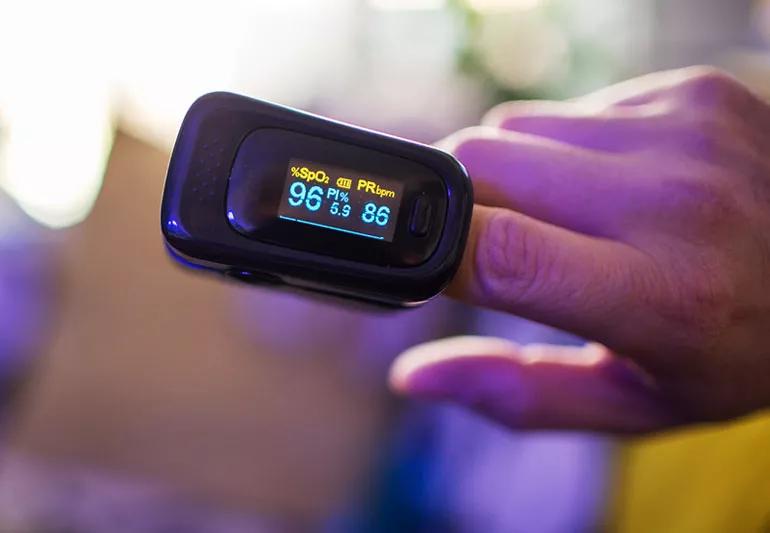Keeping tabs on coronavirus symptoms

Image content: This image is available to view online.
View image online (https://assets.clevelandclinic.org/transform/78d68a82-a606-4c89-998b-7bc41fe9c9a3/pulseOximeter-1216546578-770x533-1_jpg)
Pulse oximeter in use on finger
First, it was hand sanitizer and disinfectant wipes. The latest item flying off the shelves in response to the 2019 novel coronavirus? The pulse oximeter, a medical device that clips to your finger to measure the amount of oxygen in your blood.
Advertisement
Cleveland Clinic is a non-profit academic medical center. Advertising on our site helps support our mission. We do not endorse non-Cleveland Clinic products or services. Policy
But is this something you actually need in your medicine cabinet? The answer is, it depends, says pulmonologist Wayne Tsuang, MD.
He breaks down what a pulse oximeter — or “pulse ox”— can tell you, and whether you might want to get one.
Oxygen is the fuel your body needs to function. Insufficient oxygen in the blood can interfere with the function of the heart and brain.
Doctors have discovered that some people with COVID-19 have dangerously low blood oxygen — even though they don’t feel short of breath.
“We’re seeing reports of ‘silent hypoxia,’ or low oxygen levels in some patients without severe symptoms,” Dr. Tsuang says.
In response to those reports, people have started buying pulse oximeters to keep tabs on their oxygen levels if they get sick.
Advertisement
Pulse oximeters come in a wide variety of styles and price points. Dr. Tsuang recommends buying one from a reputable store or website, such as a pharmacy or medical device supplier.
Some smart watches and fitness trackers also measure blood oxygen saturation. But they might not be as reliable as medical devices, he cautions, so take the numbers with a grain of salt.
What should you be looking for? A healthy oxygen saturation is typically above 90%. If your number dips below 90%, Dr. Tsuang says, call your doctor for advice.
Remember, too, that low oxygen is just one sign of COVID-19. Even if you have a healthy blood oxygen level, don’t ignore other possible symptoms, like cough or shortness of breath.
“The pulse ox is just one piece of data,” says Dr. Tsuang. “If you have any concerns or questions, your doctor will look at all of your symptoms and vital signs to get the whole picture.”
Advertisement

Delivered every Tuesday!
Sign up for our Health Essentials emails for expert guidance on nutrition, fitness, sleep, skin care and more
It's a letter about the news!

Every two weeks once
Sign up for our Health Essentials emails for expert guidance on nutrition, fitness, sleep, skin care and more.
Learn more about our editorial process.
Advertisement
Most recommended precautions center around minimizing bruising or swelling
Even one drink can have an impact on your cognitive function leading to slurred speech, blurred vision and impaired memory
Understand who may (and may not) benefit
Lorem ipsum dolor sit amet. Et odio Quis vel ipsam omnis eum alias deleniti et placeat impedit non voluptas galisum hic autem enim et cupiditate aliquid. Est beatae quidem non facilis autem ut commodi nisi aut tempore rerum et dolores voluptatem cum enim optio id sapiente quasi. Ad laboriosam officiis 33 cupiditate sequi ea voluptatum consectetur qui necessitatibus voluptate et quasi doloremque et facere explicabo quo explicabo officia
Seeking help through therapy can be an important step in improving your quality of life when you have UC
Type 2 diabetes isn’t inevitable with these dietary changes
Applying a hot or cold compress can help with pain
Pump up your iron intake with foods like tuna, tofu and turkey